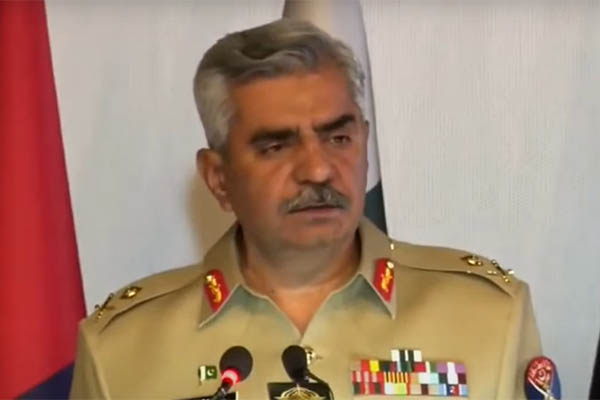
Screengrab of Maj. Gen. Babar Iftikhar’s press conference
Pakistan’s military spokesman on Tuesday defended the budgetary increase for the armed forces in the federal budget for the upcoming fiscal, saying the propose allocation has been determined “considering threat perception, challenges, nature of deployment, and resources.”
In an interview with private broadcaster Dunya News, Inter-Services Public Relations (ISPR) Director General Maj. Gen. Babar Iftikhar said that any increase to the Army’s allocation provoked an “annual debate,” adding that rival India had been expanding its budget and additional resources were needed to maintain national security.
Last week, Finance Minister Miftah Ismail presented a budget that allocated Rs. 1,523 billion for defense services, 11.16 percent higher than last year’s allocation. The total sum comprises 17.5 percent of the current expenditure. The hike has drawn criticism due to the prevailing economic crisis, which has seen the government make hefty cuts to social welfare initiatives, including development, health, education, and housing.
Clarifying the budgetary increase, the military spokesman said the defense services’ allocation had not been increased since 2020. “If you look at the defense budget from an inflationary perspective, then it has been reduced,” he claimed. “The budget of the armed forces, compared to the GDP, is constantly going down. It was 2.8% of the GDP last year and is at 2.2% this year,” he added.
He said the armed forces were also committed to austerity, claiming they had taken Rs. 100 billion less in the budget if inflation was considered, and the forces had also initiated measures to reduce utility bills. “We have reduced unnecessary movement to save petrol and diesel,” he said, adding that the Army has also started holding conferences online instead of through physical events that incur additional costs. He also said that the Army had returned Rs. 6 billion from COVID allotments and Rs. 3.5 billion from other allotments in last year’s budget.
No conspiracy
On ousted prime minister Imran Khan’s repeated claims that he was removed through a “U.S.-backed” conspiracy, the military spokesman stressed that he had clarified this several times already, and rejected the narrative once more. He said two separate meetings of the National Security Committee (NSC), which were attended by the top military leadership, had “clearly” determine that there was no conspiracy or any evidence pointing to one.
“Nothing like that happened. Participants were told in detail that there was no evidence of any conspiracy,” said Iftikhar, adding that the “blatant interference” descriptor used by authorities was a diplomatic term and did not constitute any kind of conspiracy.
Lamenting that propaganda had been initiated against the military leadership on social media after it clearly voiced “neutrality” in political affairs, he said such baseless rumors and propaganda were “very unfortunate and shouldn’t happen.” Stressing that everyone had the right to voice their opinions, he said this did not mean people could “reject facts and target an institution and its personalities on the basis of lies.”
FATF
On possibility of Pakistan being whitelisted by Financial Action Task Force (FATF) in the ongoing plenary meeting, the DG ISPR said he did not wish to comment on it but emphasized that “New Delhi had lobbied to get Pakistan blacklisted.” He said the government had formed a special cell in 2019 to address the FATF’s prior actions, adding that this cell had been tasked with coordinating between different departments, ministries and agencies. “This special cell formulated a complete action plan and all departments, ministries and agencies implemented it. The cell worked day and night to develop an effective strategy for money laundering and terror financing, which was implemented by all departments,” he said, adding that this had allowed Pakistan to enact legislation and implement 26 of 27 points of the global watchdog.
He claimed the legislation had helped Pakistan recover Rs. 58 billion.
Musharraf’s return
On the ailing health of former military ruler Pervez Musharraf, who is in self-exile in the U.A.E., Maj. Gen. Iftikhar said the military leadership believed that he should return to Pakistan. “In such a situation the institution and leadership’s stance is that Pervez Musharraf should return,” he said, adding that the final decision on this rested with the doctors and family of the former Army chief.
“We have contacted his family; once they respond, we can make the required arrangements,” he said, and prayed for Musharraf’s speedy recovery.
CPEC projects
The military spokesman also addressed Pakistan’s ties with China, noting that a recent visit to the neighboring nation by Chief of Army Staff Gen. Qamar Javed Bajwa had been “very important.” He said China had played a crucial role in increasing Pakistan’s defense capabilities. He emphasized that ties between Islamabad and Beijing were strategically important and were crucial for regional peace. He also clarified that the military was ensuring security of China-Pakistan Economic Corridor (CPEC) projects and work on projects under it were continuing unhindered.
